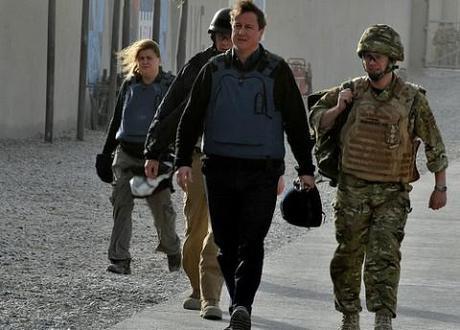
UK Prime Minister David Cameron in Afghanistan. Photo credit: isafmedia, http://flic.kr/p/8ZdTNv
Britain and the US are set to withdraw from their combat role in Afghanistan by the middle of 2013, President Barack Obama and Prime Minister David Cameron are expected to agree on Wednesday. Some troops will remain until the end of 2014 in an advisory and training capacity.
Cameron is heading to the US for a three-day official visit, and the future of military engagement in Afghanistan is likely to take centre-stage in the PM’s discussions with Obama. There is mounting anger in the country after a lone soldier shot and killed 16 civilians in a night-time attack on Sunday in Kandahar province. And some sections of the UK media have been clamouring for withdrawal after six British soldiers were killed in Afghanistan in early March.
The US President has expressed his condolences for the killings but insisted there would not be a rushed transition: “In terms of our broader strategy, it is still important for us to make sure that as we transition to an Afghan lead we don’t rush for the exits in a way that could end up leading to more chaos and more disaster,” Obama said, reported ABC News.
Obama under pressure. “Although the conflict in Afghanistan began under his predecessor, Republican President George W. Bush, it is now Obama’s war,” wrote Jeff Mason and Andy Sullivan at Reuters – and Republican presidential candidates are using the situation as an opportunity to criticize the Democrat president in election year. According to Mason and Sullivan, the Republican stance has changed since the Kandahar killings: intitially, the GOP criticised Obama’s plans for early withdrawal; now, Newt Gingrich and Rick Santorum are suggesting the US should pull out as soon as possible, “while continuing to cast Obama’s handling of the situation as a lack of leadership”.
But Obama mustn’t bow to pressure. “Polls suggest that 60 per cent of Americans favour an early retreat from Afghanistan. Many Afghans, too, are impatient for occupying forces to leave,” said a Times (£) editorial. However, the US and its allies must stay focused on the aim of the mission and not abandon the country until the problems of a corrupt national government and a resurgent Taliban are resolved: “Before planned withdrawal becomes actual withdrawal, there is still time for Western leaders to forge a political settlement that can see off Afghan civil collapse.”
“As the two largest contributors to the international mission in Afghanistan, we’re proud of the progress our troops have made in dismantling al-Qaeda, breaking the Taliban’s momentum and training Afghan forces. But as recent events underscore, this remains a difficult mission,” wrote US President Barack Obama and UK Prime Minister David Cameron in a joint piece for The Washington Post.
Changing objectives. The problem is that world leaders keep altering the Afghanistan mission, argued Chris Hughes in The Mirror: “In more than 10 years that mission has changed with every six-month deployment of our troops.” Now, said Hughes, the emphasis is on training Afghan troops – but is there enough time to do this successfully before withdrawal? “The extraction of our troops is glaringly out of sync with the pace of the campaign and British forces are in a last-minute sprint to train Afghans,” Hughes wrote.
Pull out now. “Security matters must be handed over to homegrown military and police in weeks rather than year,” said a Daily Express editorial. According to the editorial, the initial objectives of the mission were completely unattainable; British troops should now withdraw and only return if there is a resurgence in exported terrorism from the country: “Too much British blood has been shed already.”
Time to deal with the Taliban. “After the spate of incidents this year, there should be no doubt in Washington that seeking a negotiated settlement to end the war with the Taliban as quickly as possible is the only way out,” wrote Ahmed Rashid in The Financial Times. Rashid reported that the US military high command has been lobbying for Obama not to withdraw troops and to continue funding the mission, while undermining State Department attempts to negotiate with the Taliban. But, Rashid said, a power-sharing deal with the Taliban “now looks increasingly inevitable” if the war is to end.

